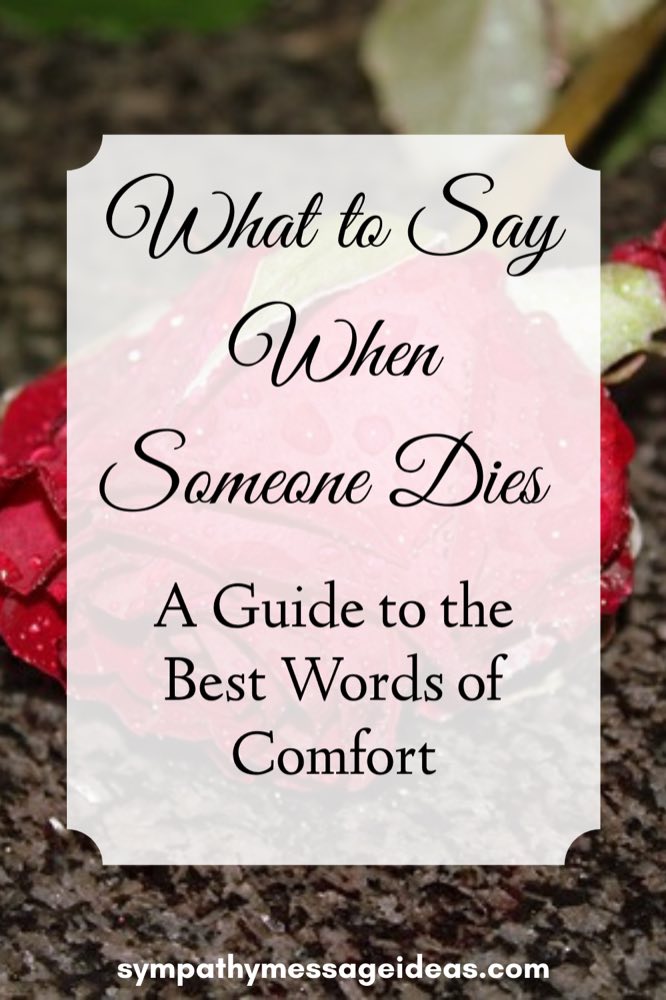It can be extremely difficult to know what to say when someone dies. Understandably we want to say the right thing. That means something comforting, helpful, and that doesn’t cause any more upset or hurt.
But what exactly are the “right” words, or the best thing to say when someone has died?
As we don’t like to discuss death it means our reaction to it is often awkward. We find dealing with loss hard, especially when we are trying to comfort someone.
Add to that the fact there is no formula or exact science to loss. The way each individual grieves is different. And what they want or need most from friends and family will differ too.
So what we write or say when someone dies should take into account the bereaved, the circumstances of their loss, the type of person they are, and so forth.
There are some tried and tested things you can say that should be of help and comfort though, regardless of the situation.
Follow the examples and guide here to help you find the ideal way to comfort someone who has experienced a loss.
For further reading on how to support someone grieving we asked 25 grief and loss professionals for their best advice, which had some fantastic tips and ideas. If someone has passed away out of tut blue turn see our guide on what to say when someone dies unexpectedly.
What to Say When Someone Dies
If you just want some examples of comforting words to say when someone dies then these short messages are ideal.
- I am so sorry to hear of your loss
- I can be there to talk if you need me. Please don’t hesitate to ask/call
- I know no words can ease your pain but please know I’m thinking of you. I’m so terribly sorry
- I wish there was more I could do. All I can say is how sorry I am
- I was so sorry to hear of ______’s passing. They were a special person and will be sorely missed
- I can’t imagine how difficult this must be. I just wanted to offer my condolences and let you know I can be there for you if you need me
- I will miss ______ terribly. They had such an amazing spirit. All my love to you
- No matter the time or place we will be there for you. You are in our thoughts and prayers, always
- I was deeply affected when I heard of your loss. Please reach out if you are struggling
- We were so shocked to hear of ______’s passing. We will do all we can to help you get through this

For a more in depth guide of what to say, how to say it and why, as well as what to avoid saying, then keep reading.
Make an Effort
That means actually doing something. Even if you’re worried it’s the wrong thing, don’t leave those mourning in loneliness during such a hard time.
It doesn’t have to be anything special – just reach out. A phone call or text message just to see how they are. Maybe an email. Send a card or gift if you think it’s appropriate.
But try to acknowledge their loss and make it known you’re thinking of them. You’d be surprised how much such a small gesture can help.
Offer Support (if you can)
When someone is grieving they often do so in silence or without making a fuss. But one of the things they need more than anything is support. That can be just knowing friends or family are there and thinking of them (as mentioned above). But also having those closest to them doing things to help.
If you can then offering to run some errands can be a huge help to the bereaved. Maybe do the grocery shopping, pick up their children from school, clean around the house. Small things that they may not feel up to whilst dealing with their grief but are uncomfortable to speak out about.
When grieving it’s easy to feel like you might become a burden. That’s why those bereaved often stay quiet. So the emphasis is on you to ask if they need or would like any help.
Remember to only offer assistance if you can truly follow through with it. The last thing they will want is someone flaky not helping when they promised to do so.
Listen
Whilst this guide is about what to say, it’s incredibly important to remember to listen as well.
Losing someone special from your life will be devastating. All sort of thoughts and emotions will arise because of it, and whilst it can absolutely be beneficial to hear from others experience and know you’re not alone, sometimes it helps to talk about your own situation.
Getting the way you’re feeling off your chest, talking about your emotions, how you’re coping, your fears etc. All of that is necessary when going through a grieving process. And that means having someone to listen.
So just being there for and listening to the bereaved, rather than having anything specifically to say, is one of the best things you can do.
Talk About your Own Experiences
This was touched upon when talking about how important listening is. That’s remains true, and you should prioritise listening to the bereaved above talking, but it can also benefit those suffering a loss to hear how others got through a similar bereavement.
You should avoid comparing deaths though. Each loss is different and unique. Keep it fairly general and maybe focus on how you coped and what helped. Don’t push anything onto them but offering some ideas, or just being an example of how it does get better may be of use.
Remember the Deceased
Sharing memories of the passed loved one might seem inappropriate but done in the correct way it can be a lovely way to remember them.
Keep it positive and light – maybe a funny anecdote or moment that you had with them. Anything that shines a light on the type of person they were and the good memories you had of them.
Keep in Touch
Don’t offer your condolences, see them once and then forget about them. Healing after a loss can take a long time and having people around you throughout that time is vital for most of us. So seeing friends drop away or forget you’re still grieving can be really hard to deal with.
That’s why you should maintain your support and check in at regular intervals to make sure they’re doing ok. Anniversaries and big holidays can be especially tough so having support then is essential. Try to make an effort to stay in touch during these difficult moments.
What NOT to Say When Someone Dies
There are some areas and topics you will want avoid talking about after someone has died.
‘Don’t Cry’
Crying is a natural reaction. You should neither encourage or discourage someone from doing it.
If they feel the need to then comfort them. If they don’t and it doesn’t happen you shouldn’t pressure them to.
In fact you shouldn’t be telling them how they should or shouldn’t react. Period. Let them grieve and express that grief however they need to. All you should do is be there and support them.
‘I Know How you Feel’
The problem with saying this is anyone other than the person going through their particular loss doesn’t know how they feel. We all have individual and different responses to loss and we grieve differently. It may hit some people more than others. Some may cry, be angry, even feel numb. So saying ‘I know how you feel’ isn’t helpful.
‘At Least…’
Don’t say anything that begins with ‘at least’. This implies there is a positive to be taken from someone’s death, and the bereaved will almost certainly not feel that way.
Even if it is a relief someone isn’t suffering anymore, saying “at least he/she isn’t suffering anymore” is not going to be what helps the bereaved family feel better.
‘Everything Happens for a Reason’
This is a common phrase to use when someone dies but it should really be avoided. When someone has lost a loved one they don’t want to hear that there was a reason for that persons death. Nothing can ever explain or make it acceptable that we lose people so special to us.
‘It’s Time to Move On’
Grief has no end date or time limit. Many people will never stop grieving and the idea they should ‘move on’ is quite insulting. We remember and mourn the loss of our loved ones forever, even if we don’t show it in the surface. So any talk of moving on should be avoided.
What to Write When Someone Dies
If you are unable to see the bereaved in person, and for various reasons it isn’t always possible, then a sympathy card and message is an acceptable alternative.
These are just a few ideas of what to write when someone has died:
- Sending you my deepest condolences
- My most sincere condolences after such a tragic loss
- We are so sorry for your loss. You have our deepest sympathy
- Wishing you strength and support from the people around you. We are very sorry for your loss
- You will be in my thoughts as you come to terms with such a terrible loss. All my love
For more examples see these 75 sympathy message examples or our ultimate guide on what to write in a sympathy card. If you prefer to send a letter then our sample sympathy letters or condolence note examples should help give you an idea of what to write.
Conclusion
Finding comforting words to say when someone dies is tough for everyone. Try your best to navigate the difficulties of loss and how to best deal with those grieving. It’s best to take the risk you say the wrong thing than nothing at all. As long as you reach out though and show your love and support they will appreciate whatever you say. Just being there for them is the main, and best thing you can do. Start with that and you should be fine.



